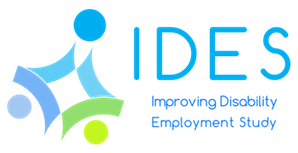About the Study
IDES is a longitudinal study which aims to provide evidence about how people with disability obtain and sustain long-term employment. This research investigates the financial and health impacts of different employment outcomes on people with disabilities. The findings will identify ways to improve employment outcomes for people with disabilities and contribute to new government policies and models of service delivery.
Background and Aims
IDES is a national, prospective cohort study of first-time jobseekers with a disability. Australians with disability are less likely to be in paid work and relative to other Australians they are more likely to be over-educated for their jobs, have lower earnings and poorer job satisfaction. Previous research on employment services for people with disabilities has collected data from service providers and employers. This is the first time in Australia that detailed data will be collected from people with disabilities who attend employment services.
The main objectives are to identify the following:
- Jobseekers’ aspirations and expectations of employment services and workplaces
- Individual and service-related characteristics supporting jobseekers in gaining and maintaining employment
- The characteristics of workplaces, jobs and employment services that contribute to sustained and meaningful employment
Data Collection
There are two waves of planned data collection. In collaboration with a number of disability employment service agencies, we will recruit first-time jobseekers who have a disability. Wave 1 is planned, with a subsequent wave occurring at 12-months (Wave 2). Participants will be asked to complete two questionnaires over a 12-month period. The questionnaire asks about demographic information; details of disability; employment history; socio-economic characteristics; access to social and economic resources (e.g. social support, transport). It will also include aspirations regarding employment (e.g. type of job and employment conditions such as place and hours of work), and details of personal wellbeing and quality of life.
